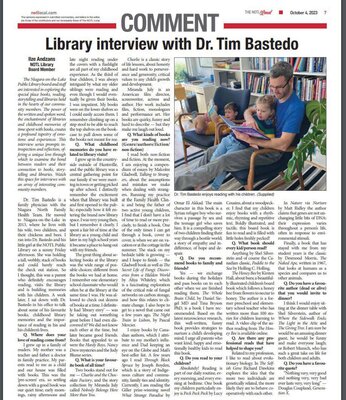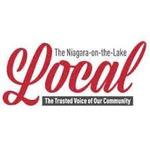Library interview with Dr. Tim Bastedo
The Niagara-on-the-Lake Public Library board and staff are interested in exploring the special place books, reading, storytelling and libraries hold in the hearts of our community members. The power of the written and spoken word, the enchantment of libraries and childhood memories of time spent with books, creates a profound tapestry of emotions and experiences. This interview series prompts introspection and reflection, offering a unique lens through which to examine the bond between readers and their connection to books, storytelling and libraries. Watch this space for interviews with an array of interesting community members. Dr. Tim Bastedo is a family physician with the Niagara North Family Health Team. He moved to Niagara-on-the-Lake in 2013, where he lives with his wife, two children, and their chickens and bees. I ran into Dr. Bastedo and his little girl at the NOTL Public Library on a sunny Friday afternoon. She was holding a tall, wobbly, stack of books and could barely reach the check out station. So I thought, this was a parent who definitely encourages reading, visits the library and is building memories with his children. A week later, I sat down with Dr. Bastedo in his office to talk about some of his favourite books, childhood library memories and the importance of reading in his and his children’s lives. Q. Where does your love of reading come from? I grew up in a family of readers. My mother was a teacher and father a doctor in family practice. My parents read to me as a child and our house was filled with books. This was the ‘pre-screen’ era, so settling down with a good book was our quiet time; early mornings, rainy afternoons and late night reading under the covers with a flashlight are all part of my childhood experience. As the third of four children, I was always intrigued by what my older siblings were reading and even though I would eventually be given their books, I was impatient. My books were on the lower shelves so I could easily access them. I remember climbing up on a step stool to be able to reach the top shelves on the bookcase to pull down some of the books not meant for me. Q. What childhood memories do you have related to library visits? I grew up in the countryside outside of Huntsville, and the public library was a central gathering point for our family if we were meeting in town or getting picked up after school. I distinctly remember the excitement when that library was built and first opened to the public; especially how it felt entering the brand new library space. I was very young then, but I remember it clearly. I spent a fair bit of time at the library as a young child and later in my high school years it became a place to hang out with my friends. The great thing about selecting books at the library was the wide range of possible choices; different from the books we had at home. I remember one elementary school classmate who would often be at the library at the same time I was. He was allowed to check out dozens of books at a time. I definitely had ‘library envy’ — was he taking out something great before I had even discovered it? We did not know each other at the time, but later became good friends. Books that appealed to us were the Hardy Boys, Nancy Drew mysteries and the Judy Blume series. Q. What is your favourite book of all time? Two books stand out for me — Charlie and the Chocolate Factory, and the story collection by Miranda July called Nobody Belongs Here More than You. Charlie is a classic story of life lessons, about honesty and hard work to perseverance and generosity, critical values to any child’s growth and development. Miranda July is an American film director, screenwriter, actress and author. Her work includes film, fiction, monologues and performance art. Her books are quirky, funny and hard to describe — but they make me laugh out loud. Q. What kinds of books are you reading now? (Genre/authors/fiction/ non-fiction) I read both non-fiction and fiction. At the moment, I am enjoying a compendium of essays by Malcolm Gladwell, Talking to Strangers, about the assumptions and mistakes we make when dealing with strangers. Running my practice at the Family Health Clinic and being the father of two active young children, I find that I don’t have a lot of time to read or more precisely, to finish a book. One of the only times I can get through a book, cover to cover, is when we are on vacation or at the cottage in the summer. The stack on my bedside table is growing — and I hope to finish — the Gladwell book as well as The Secret Life of Fungi: Discoveries from a Hidden World by Aliya Whiteley, which is a fascinating exploration of the critical role of fungal networks on carbon storage, and how this relates to climate change. I also hope to get to a novel that came out a few years ago, The Night Train to Lisbon, by Pascal Mercier. I enjoy books by Canadian authors, which I attribute to my mother’s influence and Dad keeping an eye on the Globe and Mail’s best-seller list. A few years ago I read Through Black Spruce by Joseph Boyden, which is a story of Indigenous culture and community, family ties and identity. Currently, I am reading the Giller prize-winning novel What Strange Paradise by Omar El Akkad. The main character in this book is a Syrian refugee boy who survives a passage by sea and the teenage girl who saves him. It is a compelling story of two children finding their way through a hostile world; a story of empathy and indifference, of hope and despair. Q. Do you recommend books to family and friends? Yes — we exchange books during the holidays and pass books on to each other when we are finished reading them. The Whole Brain Child, by Daniel Siegel MD and Tina Bryson PhD, is a book I have recommended. Based on the latest neuroscience research, this well-written, funny book provides strategies to nurture a child’s developing mind. I urge all parents who want kind, happy and emotionally healthy kids to read this book. Q. Do you read to your children? Absolutely! Reading is part of our daily routine, every morning, and every evening at bedtime. One book my children particularly enjoy is Peck Peck Peck by Lucy Cousins, about a woodpecker. I find that my children enjoy books with a rhythmic, rhyming and repetitive text. Boldly illustrated, and tactile, this board book is fun to read and is filled with little holes freshly pecked! Q. What book should every kid/person read? Anything by Shel Silverstein and of course the Canadian classic, Paddle to the Sea by Holling C. Holling. The Honey Bee by Kirsten Hall, about bees; a beautifully illustrated children’s board book which follows a honey bee from flowers to nectar to honey. The author is a former preschool and elementary school teacher who has written more than 100 stories for children learning to read. A video clip of the author reading from The Honey Bee is available online. Q. Are there any professional reads that have helped to shape you? Related to my profession, I like to read about evolutionary biology. In The Selfish Gene Richard Dawkins explores the idea that the more two individuals are genetically related, the more likely they are to behave cooperatively with each other. In Nature via Nurture by Matt Ridley the author claims that genes are not unchanging little bits of DNA: their expression varies throughout a person’s life, often in response to environmental stimuli. Finally, a book that has stayed with me from my student years is the classic by Desmond Morris, The Naked Ape, written in 1967, that looks at humans as a species and compares us to other animals. Q. Do you have a favourite author (dead or alive) that you would invite to dinner? I think I would enjoy sitting at the dinner table with Shel Silverstein, author of Where the Sidewalk Ends; The Light in the Attic and The Giving Tree. I am sure he would be an amusing dinner guest, he would be funny and make everyone laugh; or Robert Munsch, who has such a great take on life for both children and adults. Q. Do you have a favourite quote? “Nothing very, very good and nothing very, very bad ever lasts very, very long” — Douglas Coupland, Generation X.




